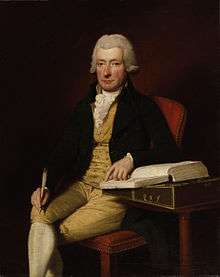God Moves in a Mysterious Way
| God Moves in a Mysterious Way | |
|---|---|
| Hymn | |
 William Cowper, author of the hymn text | |
| Full | Conflict: Light Shining out of Darkness |
| Text | by William Cowper |
| Meter | 8.6.8.6 (CM) |
| Melody |
|
| Published | 1774 |
| |
"God Moves in a Mysterious Way" is a Christian hymn, written in 1773 by William Cowper from England.
Words
The words were composed by William Cowper (1731–1800). Comprising six verses, they were written in 1773, just before the onset of a depressive illness, during which Cowper attempted suicide by drowning. The text was first published by Cowper's friend, John Henry Newton, in his Twenty-six Letters on Religious Subjects; to which are added Hymns in 1774. The hymn was later published in Olney Hymns which Cowper co-wrote with Newton. Entitled Conflict: Light Shining out of Darkness, it was accompanied by a text from Saint John's Gospel, Chapter 13: Verse 7, which quotes Jesus saying to his disciples; "What I do thou knowest not now; but thou shalt know hereafter."[1]
God moves in a mysterious way
His wonders to perform;
He plants His footsteps in the sea
And rides upon the storm.
Deep in unfathomable mines
Of never failing skill
He treasures up His bright designs
And works His sov’reign will.
Ye fearful saints, fresh courage take;
The clouds ye so much dread
Are big with mercy and shall break
In blessings on your head.
Judge not the Lord by feeble sense,
But trust Him for His grace;
Behind a frowning providence
He hides a smiling face.
His purposes will ripen fast,
Unfolding every hour;
The bud may have a bitter taste,
But sweet will be the flow’r.
Blind unbelief is sure to err
And scan His work in vain;
God is His own interpreter,
And He will make it plain..
The first line of the hymn has become an adage or saying, encouraging a person to trust God's greater wisdom in the face of trouble or inexplicable events,[2] and is referenced in many literary works.[3]
Music
The hymn tune London New comes from the The Psalmes of David in Prose and Meeter of 1635. In Common Praise, it is in D major. A popular alternative and rather similar tune is Dundee, which comes from the Scottish Psalter of 1615; the harmony was arranged by Thomas Ravenscroft (1592-1635) in 1621.[4] Other traditional tunes include Manoah, first published by Henry Wellington Greatorex in Boston, Massachusetts in 1843 but sometimes attributed to Joseph Haydn,[5] and Irish by Charles Wesley, first published in 1749.[6]
Inclusion in other works
- Variation (4) on Old Psalm Tunes, Book 1, George Dyson
- Saint Nicolas by Benjamin Britten (1948 cantata) - the final movement IX, The Death of Nicolas
- Joy Beyond the Sorrow: Indelible Grace VI, a 2012 album by Nashville, Tennessee based artist collective, Indelible Grace[7]
References
- ↑ Hymnary.org: Psalter Hymnal (Gray) - 434. God Moves in a Mysterious Way
- ↑ English Club - God moves in a mysterious way
- ↑ Excellence in Literature - Light Shining Out of Darkness by William Cowper
- ↑ Hymnary.org: a comprehensive index of hymns and hymnals - Tunes - Dundee (Ravenscroft)
- ↑ C Edward Spann and Michael Edward Williams, Presidential Praise: Our Presidents and Their Hymns, Mercer University Press 2008 ISBN 0-88146-117-2 (p.102)
- ↑ Church Music Dublin - Charles Wesley (1707-88) -The Legacy
- ↑ Joy Beyond the Sorrow: Indelible Grace VI - Indelible Grace Music, www.amazon.com, Accessed: 10 May 2014